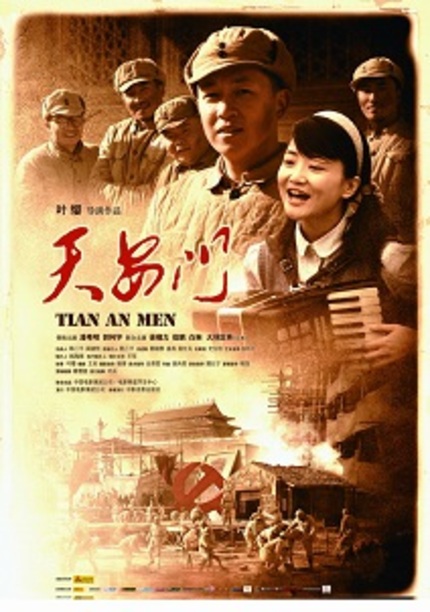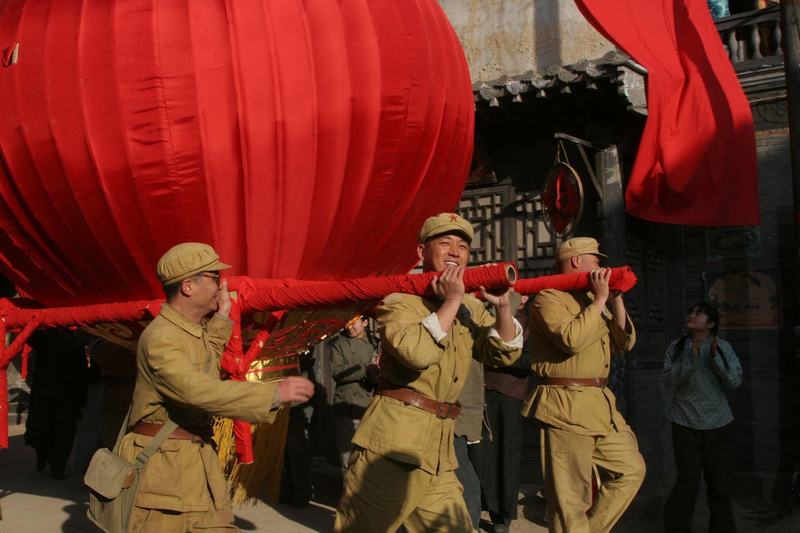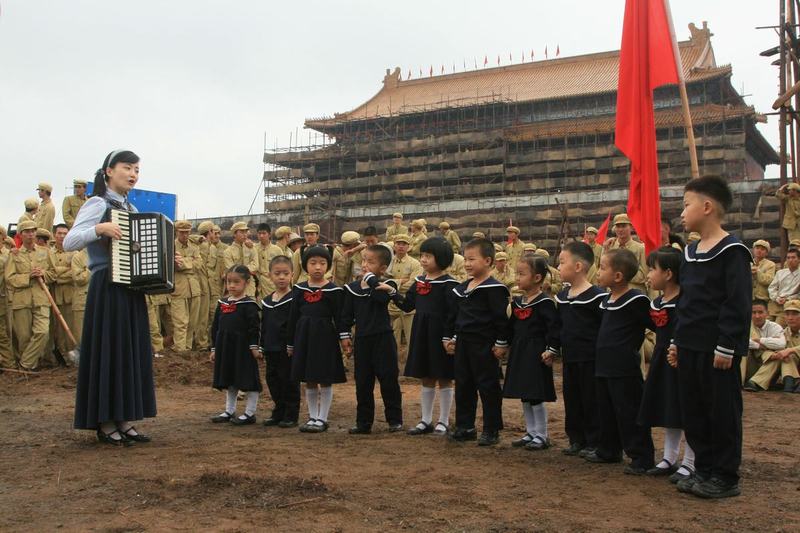TIANANMEN review

Is there any other Chinese word viewed in quite the same way by the rest of the world? Regardless of precisely what happened on June 4th, 1989, it is generally accepted the PRC have a vested interest in putting a happy face on the gate to the Forbidden City. Ye Daying's fourth film Tiananmen is a propaganda effort, pure and simple - nonetheless the director's undeniable skill and lightness of touch in handling what is a relatively simple premise make it oddly entertaining.
Tiananmen is the third film in Ye Daying's Red Trilogy, following Red Cherry (1995) and A Time to Remember (1998). Set shortly after the end of the Chinese Civil War and the Communist forces' victory, the story centres on a small unit of army engineers and designers entrusted with the responsibility of renovating the great gate at the edge of Tiananmen Square. Based on real events - Mao delivered his speech marking the founding of the PRC from the very same location - the film follows the unit as they struggle to finish the work before the ceremony.
And that's it. There's very little pronounced dramatic conflict here, even for a propaganda piece; none of the horrors of war (Red Cherry), or any attempt at an outsider's perspective (A Time to Remember). Not only is the outcome dead certain but any issues the characters struggle with are kept decidedly low-key.
The affable leader (Pan Yueming) desperately wants to prove himself a worthy party member despite not having seen as much action as the 'real' soldiers. The comic relief nurtures a timid attraction to a pretty street musician (Guo Keyu, Red Cherry, Perfect Bride). The Japanese exile (Noboru Shinoda) - fleeing persecution for protesting against Nipponese military aggression (yes, really) - dreams of seeing his wife and child again.
The only concessions towards a bigger picture beyond the founding of a nation are the plot point which introduces the aged lantern-maker under whom the unit must mentor to have a hope of successfully dressing the gate. This is a nod to all those poor, deluded souls who clung to a China ruled by imperial dynasties, let alone supported the Nationalists, meaning of course the old man gets up to cheer for Mao's vision of a bright new future before the credits roll.
Yet Tiananmen proves surprisingly engrossing for all this. It's resolutely upbeat, with very little glossing over inconvenient historical details and never snide or superior. Everyone throws their weight behind the project with never a word of protest, true, but the script is (relatively) free from victors' justice or the poisonous xenophobia in something like On The Mountain of Taihang. These people feel human, swept up in the moment. They're allowed to bicker and quarrel, even to snipe at or double-deal each other. It makes their touting the party line seem less like sloganeering and more like actual generosity of spirit.
The film is also startlingly well put together. Obviously propaganda is in large part about presentation but Ye Daying's work here ranks far above Red Cherry, his direction almost effortless, with frequent beautiful camera flourishes and wonderfully composed framing. The filmmakers show uncommon restraint given their subject matter - focusing on the CGI backdrops (think Always, with 1949 Beijing rather than Tokyo) solely at key moments, to laudable effect. Some of it is weak - compositing newsreel footage of Mao into the film doesn't always work - but the final aerial flight around the square before his speech is staggering to watch regardless of the ideology behind it.
But Tiananmen is propaganda and for all the craft behind it, all the tact and subtlety (of sorts), it's still not much of a film. There's lots here to take pleasure in but not much that proves particularly memorable after viewing. Again, there's little to no tension. The cast, for all their effort, aren't much more than two-dimensional, if that. And the coda - a flashforward to the leader as an old man in the present day - leaves something of a sour taste in the mouth, with the audience repeatedly assured everything is fine as the credits roll over a photo-montage of key moments in the plaza's history. Tank Man is conspicuous by his absence.
Nothing like the rabid nationalist screed might expect, Tiananmen is more than watchable, fantastically shot with a cast who do their very best within the limits of the material. Predictably, however, it can't escape the fact it has a message to deliver. The film comes cautiously recommended for the curious, but anyone with no taste for the form is very likely to walk away disappointed.
Tiananmen
Director(s)
- Ying Yip
Writer(s)
- Wang Bing (screenplay)
- Yip Ying (story)
Cast
- Ke-Yu Guo
- Xu Xiao Li
- Bai Lin
- Masanobu Otsuka













